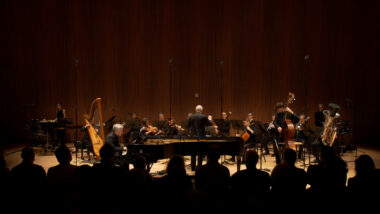 United States Time:Spans 2024 – Takasugi: Roger Admiral (piano), Talea Ensemble / James Baker (conductor). DiMenna Center for Classical Music, New York, 18.8.2024. (DS)
United States Time:Spans 2024 – Takasugi: Roger Admiral (piano), Talea Ensemble / James Baker (conductor). DiMenna Center for Classical Music, New York, 18.8.2024. (DS)

Steven Kazuo Takasugi – Piano Concerto ‘Sinfonietta Version’
As August signals the coming of autumn and the near-disappearance of summer, New York concertgoers can rely on a jolt of fresh energy from the 12-day annual Time:Spans Contemporary New Music Festival. On any given evening, these short concerts offer excellent musicianship and stellar compositions of artistic subtlety, but there are inevitably moments that stand out.
This year, Talea Ensemble’s US premiere performance of Steven Kazuo Takasugi’s Piano Concerto ‘Sinfonietta Version’ left an enduring mark. With soloist Roger Admiral at the piano, this musical ‘catalogue raisonné’ of humanity’s complex, evolving relationship to the environment was unlike any other work I have heard that evokes the profound crisis of man’s place on earth.
Broken into three movements – ‘Howl, Howl, Howl!’ (undeniably a Beat poet homage), ‘Some Cry for their Mothers’ and ‘Affektenlehre: Towards a Science of Obliteration’ – Takasugi’s poetic approach relies on skillful imagery and jarring juxtapositions. The work combines electronic samples (created in the composer’s studio) with piano solo and an ensemble of 16 players, two of whom were percussionists. With two bass drums in this small symphonic set up, booming dynamics were clearly intended to permeate the composition. Nevertheless, the concerto would also prove to capture silence as a dense space of ponderous stillness.
As the work begins, sounds seem to drop out of space and fall into a jumbled, vertical-like stacking formation with titles such as ‘A strange twittering’. The first movement builds to a section called ‘Unprecedented Behavior: The Strange Ascent’, with bass drums bellowing in tandem with electronic samples to make a powerful, industrial sound that contrasts with the difficult attempts of strings, winds and solo piano to sound through.
Takasugi times the placement of specific textures in dynamic musical power structures, creating rather unique emotional content. Conductor James Baker’s concentrated leadership met these compositional demands which Talea Ensemble members so skillfully carried to fruition. And without sound engineer Edwin Kenzo Huet at the helm, the required balance would not have been achieved so well.
Despite the simple title of Piano Concerto, the work reveals itself to be a tour de force that encapsulates, with honesty, the doom that inherently lies ahead of us. Equally, it captures a galactic-sounding response to that fate: it is no match for us puny humans. To achieve his message, Takasugi creates thoughtful content with spellbinding techniques.
Midway through the work, Admiral is required to tap a single piano key for an exceptionally long period in irregular rhythmic patterns that require technical endurance and focused listening by the audience. At other points, the ensemble players shape massive sound structures that move across the stage, almost like physical bodies in space. And at two stunning moments, Takasugi requires the ensemble to personify existence by creating synchronized, breath-like sighs with their bows and wind instruments – a heaving Leviathan appears.
In the final movement, section names include terms such as ‘void’ and ‘Sturm und Drang’. A growing density expands the music into what I interpreted as the all-encompassing abyss. Admiral immersed himself in a harrowing piano part that one strained to hear, as it gradually emerged across this frightening, yet divine, cacophony. As the concerto comes to a close, a crashing rush of loudness shifts to sudden stillness and a dark existentialism. Musicians freeze in place at the conductor’s direction – a finger left in the air after a pizzicato or a bass bow stopped part way across the strings. The musicians are transformed into trapped figures, like the ash-covered Romans at Pompeii on that fateful day.
Volcanic, it certainly was. Takasugi ingeniously works a vast palette of sound into riveting, comprehensible and thought-provoking material that left the audience awed and humbled – much like experiencing nature itself. The evening was, undoubtedly, a highlight of the festival, and a reminder that the reality of our existence faces us each day with profoundness and urgency. Balmy autumn may come and, after that, cold winter, but it is changing. And Takasugi’s Piano Concerto made no attempt to diminish this call to face reality and take it seriously.
Daniele Sahr
